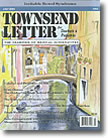


July 2004
Forbidden Medicine
review by Irene Alleger
Women and Cannabis: Medicine, Science and Sociology
Ethan Russo, MD, Melanie Dreher, PhD, & Mary Lynn Mathre, RN, MSN,
Editors
The Haworth Integrative Healing Press, 10 Alice St., Binghamton, New
York 13904 USA; orders@haworthpress.com
Softcover, 2002, $19.96 US + postage & handling, 187 pp.
This first of a kind book will undoubtedly be hailed by some, and
reviled by others. The editors felt that the topic was appropriate
on several levels. Medical research has been remiss in addressing women's
issues on a historical basis, and secondly... "many gender-specific
conditions, and female-predominant medical conditions are popularly
treated with cannabis." These include dysmenorrhea, migraine,
fibromyalgia, and a wide variety of autoimmune disorders such as rheumatoid
arthritis and multiple sclerosis. The editors have amassed a surprising
amount of evidence including molecular studies, animal studies, case
reports, and longitudinal cohort studies.
The lead editor, Ethan Russo, MD reviews the historical evidence of Cannabis
use as a medicine in obstetrics and gynecology, noted as early as the 11th
century in the Old English Herbarium. In the 17th and 18th centuries "hemp" was
widely used to increase the force of uterine contractions during labor, as
well as relieving severe vomiting of pregnancy. Silver (1870) devoted an entire
article to the use of cannabis to treat menorrhagia and dysmenorrhea, reporting
on 5 cases — all relieved with cannabis within a few doses. Dr. Russo concludes: "Numerous
citations historically support the notion that cannabis is quite potent in
its obstetric and gynecological actions, with specific attestation that medical
benefits are frequently obtained at doses that are sub-psychoactive. The therapeutic
ratio of cannabis with respect to cognitive impairment seems generous." (This
section is followed by six pages of bibliography — dated from 1291 to 2002)
.
There are further chapters on "Endocannabinoid Degradation and Human
Fertility," "Hyperemesis Gravidarum and Clinical Cannabis: To
Eat or Not to Eat?" "Combined Treatment of Tourette Syndrome
with delta-9-tetrahydrocannabinol and Dopamine Receptor Antagonists." There
is an interesting personal account of medical use of cannabis by an English
television producer, married with two children. Her account of using cannabis
to relieve the symptoms of multiple sclerosis is straightforward, detailed,
and includes consulting her doctor (he didn't know much about it but
thought it probably wouldn't hurt her). She had this to say: "Like
all medicines and drugs cannabis has a mixture of physical and psychoactive
effects. One common physical effect is that it relaxes muscles, which is one
reason why people enjoy using it, but when you have MS, relaxing muscles is
not just fun — it is very important.... Similarly, the more I talk to ill
and disabled people who use cannabis, the more I think the psychoactive effects
are vital to its therapeutic value...for many sufferers, being depressed and
demoralized is the hardest aspect of the disease to live with and can be extremely
debilitating...cannabis lifts you to normality."
Another chapter on "Cannabis in Multiple Sclerosis: Women's Health
Concerns" cites scientific literature including supportive case reports,
single-patient trials and randomized clinical trials. Large-scale clinical
trials are underway to answer questions concerning the efficacy and safety
of cannabis in patients with MS. The author notes: "Multiple sclerosis
is a disorder with important gender-associated differences in expression. Cannabis
also interacts with the endocrine and immune systems of males and females with
distinctions. As therapeutic cannabis use among MS patients has increased over
the past generation, a review of the subject with attention to women's
health concerns is warranted." Currently, the only large scale trials
are in the UK.
This text is unique to my knowledge; I was unaware of all the clinical trials
on cannabis outside the US. But even here, there is evidence that the scientific
medical community is seriously exploring the specific benefits of cannabis
in women's health, especially in obstetrics and gynecology. We are so
used to hearing this plant called an illegal drug, that we forget it is an
herb and has been used historically for medical uses as all herbs have been.
Unfortunately, the medical establishment has no use for herbs until they have
been turned into pharmaceutical drugs, so in spite of all the research, cannabis
will probably remain an underground medicine in the US as long as the current
pharmaceutical paradigm continues to rule.
Search
our pre-2001 archives
for further information. Older issues of the printed magazine are also
indexed for your convenience.
1983-2001
indices ;
1999-Jan. 2003 indices
Once you find the magazines you'd like to order, please use our
convenient form, e-mail subscriptions@townsendletter.com,
or call 360.385.6021 (PST).
All rights reserved.
Web site by Sandy Hershelman Designs

